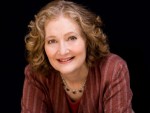Title
In presenting the very first master class of its debut season, the Juilliard Historical Performance program may have invited any number of instrumentalists. Instead they chose a soprano, the English early music specialist Dame Emma Kirkby, to lead the class on November 2. As Kirkby pointed out, “All the treatises for hundreds of years said instrumentalists should try and play like singers.” At Juilliard, she plans to emphasize the ways in which musicians of different instruments can inspire and influence each other as she works with students from both Vocal Arts and Historical Performance.
Body
In a world dominated by operatic voices and post-Baroque vocal repertoire, Kirkby did not initially conceive of becoming a professional singer. Instead, her career gradually came about as a result of her involvement with amateur early music groups, along with encouragement from the headmaster at the school where she once taught. Her frequent reference to the word “luck” implies just how important she thinks timing had to do with the blossoming of her career. “It was the heady late ’70s when the record companies were investing in this sort of thing, so our generation of explorers was very lucky. It was all uncharted territory and certainly not universally accepted.”
Timing may have been an important factor, but Kirkby, 60, downplays the role that her own voice had in garnering the attention of audiences and record labels. In 2007, BBC Music Magazine ranked her 10th among the world’s greatest sopranos. She has made hundreds of recordings that span centuries of music, from the 12th-century sequences of Hildegard von Bingen to the 20th-century songs of American composer Amy Beach. The eras she cherishes most, though, are those of the Renaissance and Baroque.
“I do think you learn a tremendous amount by having the right instruments to play with. And when I say right instruments, I mean some faithful attempt to reproduce the instruments the composers knew,” she said. Kirkby’s commitment to this point highlights why she feels the new Historical Performance program at Juilliard is so valuable. She adamantly believes that singers should draw their vocal colors from the instruments that accompany them. The quality of sound from a lute or a fortepiano differs dramatically from that of a modern piano, and she finds that the more singers collaborate with instrumentalists from different time periods, the more variety of sounds they will be able to create in their own vocal production. However, Kirkby proclaims that she is not academically a pioneer at all; rather, she reacts to the instruments around her. “I instinctively respond to what I’m hearing rather than decide I should make a certain sound because it’s correct,” she said. “I think that I had an advantage in that I had so many more sounds, so many more different colors to sing with. I mean the piano was there, but it wasn’t the main thing; it wasn’t the inevitable background to everything that happened.”
Kirkby believes historical instrumentalists also have much to learn from singers, especially in regard to the fact that emulation of the human voice has been such an important part of music-making throughout the centuries. For instance, she does not advocate a strict, straight-tone approach, since the voice vibrates so naturally. More importantly, she believes in “a vocal sound that is hung on the words.” For instrumentalists, this translates to clean attacks of notes, with a vibrato that comes later as a sort of enrichment of the note. For singers, she stresses the importance of consonants in sound production, urging them to experiment with the idea that consonants can actually enhance volume without requiring extra work from the body.
Collaboration is an integral component of Kirkby’s art. One of her favorite instruments is the lute, one she considers “the most magical.” During her stay in the United States, she will be performing with lutenist Jakob Lindberg at venues across the country, including concerts at Weill Recital Hall and the Madison Avenue Presbyterian Church in New York City.
One major passion of Kirkby’s is vocal ensemble singing, a practice she bemoans as a lost art but one that deserves a renaissance. This goes hand-in-hand with her love of performing with period instruments, a practice that does away with many of the balance issues singers find themselves facing with the modern piano. In ensemble singing, Kirkby claims that singers can be “soloistic but also in balance, never having to shout, never having to fight imbalanced forces, but also confronting subtly demanding repertoire.” She added, “Some incredibly good music was written, which are forces that seem so remote from us because we don’t get together in sets of five and six and sing very complex madrigals anymore. Why not? We should.”





